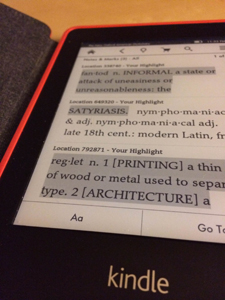 Julia Larson is a freelance copywriter & copyeditor. When she’s not on a quadrilateral device, she’s on her yoga mat, a hike, or a cooking spree.
Julia Larson is a freelance copywriter & copyeditor. When she’s not on a quadrilateral device, she’s on her yoga mat, a hike, or a cooking spree.
Fantods. Reglets. Circumorals. Kliegs. Boscages. These are just a sampling of the many vocab words I’ve highlighted in Infinite Jest. How many of us actually go back and look up those difficult words that we encounter — especially during an engrossing read?
Honestly, when reading print books, I’d rarely go back and research those noggin-scratchers. Here’s why my Kindle Paperwhite’s Dictionary Look-up Feature has revolutionized my reading:
1. It’s a (relatively) seamless experience.
When using my Kindle Paperwhite, I hardly interrupt my reading to satisfy my lexical curiosity. Keep in mind that the feature does take a moment to pop up (compared to the speed of current mobile devices).
 2. It’s interactive.
2. It’s interactive.
I find that my kinesthetic and visual learning is very happy with the ability to touch the screen and see the dictionary screen pop up. If you’re using a touchscreen eReader, simply holding your finger down on the word brings up the dictionary preview, plus the option to highlight or read the full definition. This interaction still leaves me in awe (and I thought I was dumbstruck by typing into the original Kindle’s dictionary!).
3. It’s highlightable & catalogued.
My favorite part: You simply highlight that word, and you can return to your “Notes” section later and revisit your vocab collection.
You see, when I read from paper books, I’ll wield a pen, either circling the unknown word in the text, or keeping track elsewhere (usually on a sorry scrap of paper-turned-bookmark). Both these methods take much more time & effort.
4. It’s easy to add variety.
You can download all sorts of dictionaries and toggle between different options that you download. One eReader feature I’d like to see is the smart, automatic assignment of one of your dictionaries to each book, or a prompt to download the dictionary that’d best match the era and diction of the text.
5. It’s not bulky.
The eReader is already lightening your book-toting load, and the dictionary (or as many dictionaries as you want to download), add no extra weight or bulk. After all, who has that much room to spare in your backpack, purse, or car for the big Oxford editions that your eReader holds effortlessly?
It’s still our job to do the learning.
Although the dictionary look-up is supremely helpful, most of us probably don’t thoroughly absorb those words we look up (and highlight), except for those fortunate souls with photographic memory. I’ve had some words come to mind when writing (e.g., “simpering”) and have run into them elsewhere, but when it comes to memorizing and utilizing the whole breadth of words I’ve found, I need to be proactive. My belated New Years resolution? To start writing up that bevy of vocab flashcards!
Please share
But before I get started (Note: I didn’t resolve to not procrastinate), I want to ask our readers: What’s your favorite way to solidify and memorize the words you want to add to your vocabulary?